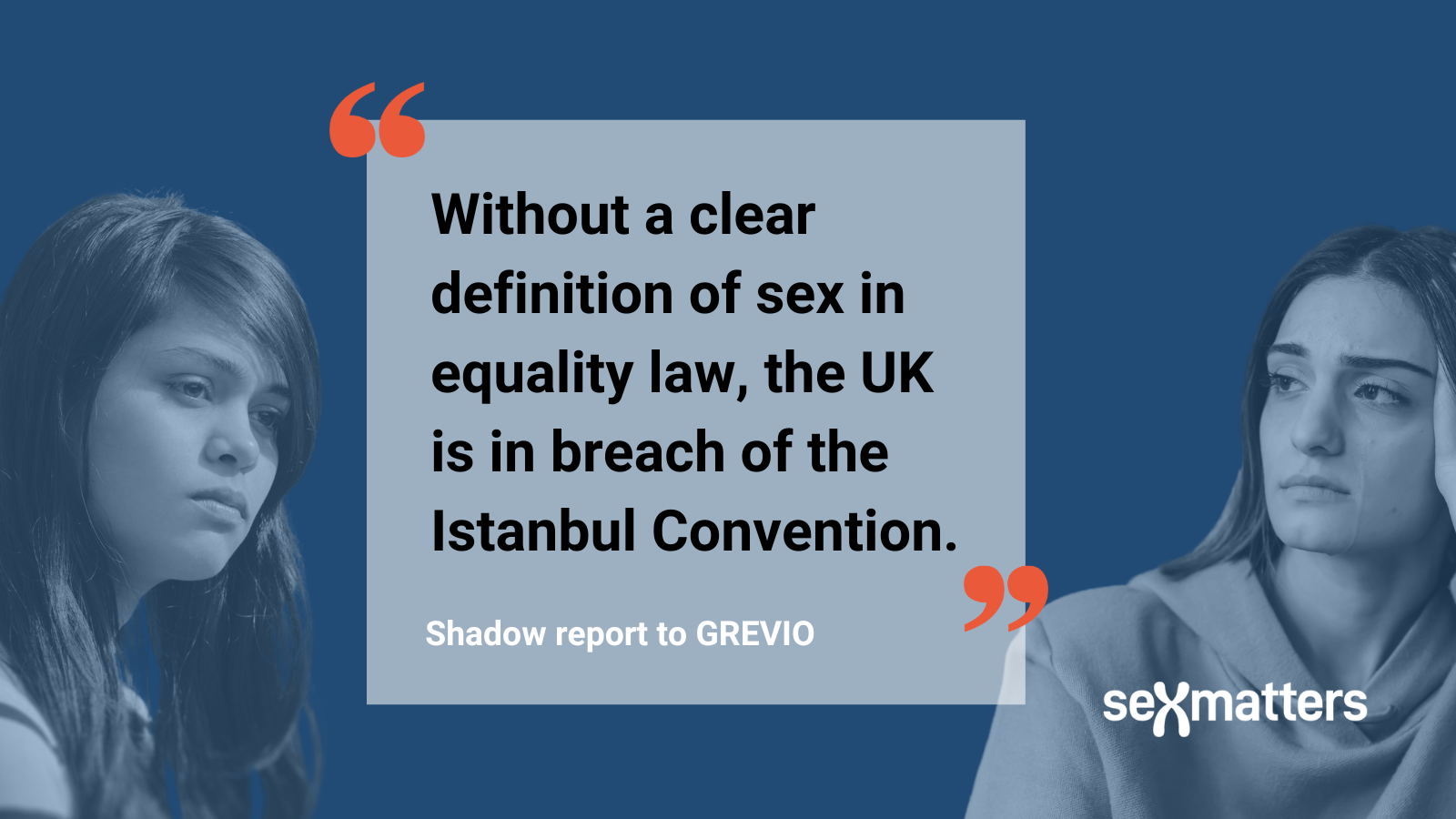Gender-critical civil society submits report to GREVIO on sex and the law

Sex Matters, Fair Play For Women and Transgender Trend, together with LGB Alliance, the Women’s Rights Network, For Women Scotland and Merched Cymru, have submitted a report on the UK’s implementation of the Istanbul Convention.
The Istanbul Convention is about violence against women
The “Istanbul Convention” is the Council of Europe’s Convention on preventing and combating violence against women and domestic violence. The UK government ratified it on 21st July 2022 and it came into force on 1st November 2022. It can be cited by UK courts as a persuasive authority.
The Group of Experts on Action against Violence against Women and Domestic Violence (GREVIO) is visiting the UK in January to monitor implementation of the convention and it has requested these “shadow reports” from civil society.
In the shadow report we argue that the UK is now in breach of the Istanbul Convention because:
- The interpretation of the definition of sex in the Equality Act no longer clearly reflects the ordinary meaning and undermines the whole purpose of the law in relation to women’s rights.
- This effect is exacerbated by widespread adoption of “Stonewall Law” – policies that are not aligned to the law at all, but to gender self-identification.
The Istanbul Convention is based on sex
The Istanbul Convention is founded on the recognition that:
“the realisation of de jure and de facto equality between women and men is a key element in the prevention of violence against women.”
It links violence against women to historically unequal power relations, discrimination against women and the prevention of their full advancement in society.
When it says “women” it is using the ordinary meaning. This is the meaning that relates to male domination and female subordination, to mothers and fathers, to forced marriage, rape and pregnancy, to femal genital mutilation and forced abortion and to the laws, traditions and social norms that shape women’s lives. As the convention spells out: although men and women both can be victims of domestic and sexual violence, these affect women disproportionately.
The convention uses the term gender as in a “gender perspective” in the implementation of the convention and a “gendered understanding” of violence against women and domestic violence to relate to the social conditions of the two sexes. In its explanatory report it says:
“This means that these forms of violence need to be addressed in the context of the prevailing inequality between women and men, existing stereotypes, gender roles and discrimination against women in order to adequately respond to the complexity of the phenomenon.”
It does not seek to promote gender-identity ideology or supplant the meaning of sex in law.
Despite this we are concerned that the shadow report to GREVIO from the coalition of Violence Against Women and Girls (VAWG) organisations across England and Wales suggests that “transgender women” are included as women by the convention, and misstates the Equality Act 2010 as including “protection from discrimination on the basis of both sex and gender”.
Victor Madrigal-Borloz, the United Nations Independent Expert on protection against violence and discrimination based on sexual orientation and gender identity, last year told the Scottish Parliament that the Istanbul Convention creates a binding commitment for the UK to enact a law for gender self-ID. This is incorrect.
In January 2024 GREVIO will be visiting the UK to evaluate whether it is meeting its commitments under the convention. We call on it to use this visit to make clear to government and civil society that the convention depends on legal protection and policies for women as a category that is based on sex.
Why the UK is in breach of the Istanbul Convention
The operation of the Equality Act is crucial to the UK’s implementation of the Istanbul Convention. This is not just about the “single-sex exceptions”. It is about the provisions against sex discrimination and harassment, the public-sector equality duty, positive action, charities and genuine occupational requirements. All of these are relevant to efforts to combat violence against women.
That men are not women is particularly important when thinking about perpetrators and victims of sexual and violent crimes against women.
Men are not women






On paper, the UK’s Equality Act 2010 is consistent with the Istanbul Convention, protecting the rights of “women”. But the question of what “women” means for the purposes of the Act has become unclear. Many organisations act as if gender self-identification is the law, collecting data and framing policy based on gender identity instead of sex.
The judgment in the For Women Scotland case (which may still be appealed) that having a gender-recognition certificate changes someone from being male to being female (or vice versa) for the purpose of the Equality Act means that female people are not recognised as a group whose welfare public authorities must consider separately from males with a certificate.
This creates adverse effects which have already been recognised by the Government and the Equality and Human Rights Commission.
In the report we set out evidence of the practical harms to women as victims of sexual and domestic violence caused by this, including:
- single-sex services lost and replaced with “gender-neutral services”
- men who identify as women able to access women-only services
- fear, loss of trust, re-traumatisation, self-exclusion and other forms of abuse such as bullying and coercion as well as physical assaults, according to those working in the women’s sector
- men who identity as women working in sensitive positions in rape-crisis centres, mental-health wards and so on
- the women’s sector silenced and in turmoil over this issue, distracted by having to defend, justify, obfuscate and sometimes hide the fact that they are trying to provide female-only services
- men reported as women by the police, prosectors and courts for the purposes of recording data on criminals and victims.
- victims forced to refer to perpetrators using their “gender identity”
- men placed in women’s prisons and in women’s centres for probation at resettlement
- male police who identify as women able to search female suspects
- schools promoting sexist stereotypes and the idea that children can be born in the wrong body, using materials that erode sexual boundaries and safeguarding
- policies based on gender identities eroding identity records and safeguarding provisions
- the needs and vulnerabilities of female people who identify as transgender not adequately considered if they are identified as “men”
- family members including “transwidows” and the children of transitioners not properly supported where they are victims of abuse.
We also highlight the campaign of violence and intimidation against human-rights defenders who speak up about this, and the weak response by the police, who have adopted gender-identity ideology.
The report concludes that without clear legal protection against discrimination or measures to allow positive action on the basis of sex, or requirement to consider the specific needs and disadvantages of women as a sex in the UK, we believe that the UK is in breach of the Istanbul Convention.
The report sets out a series of recommendations to fix this, starting with amending the Equality Act to bring back clear protection for women and men under the protected characteristic of sex.
